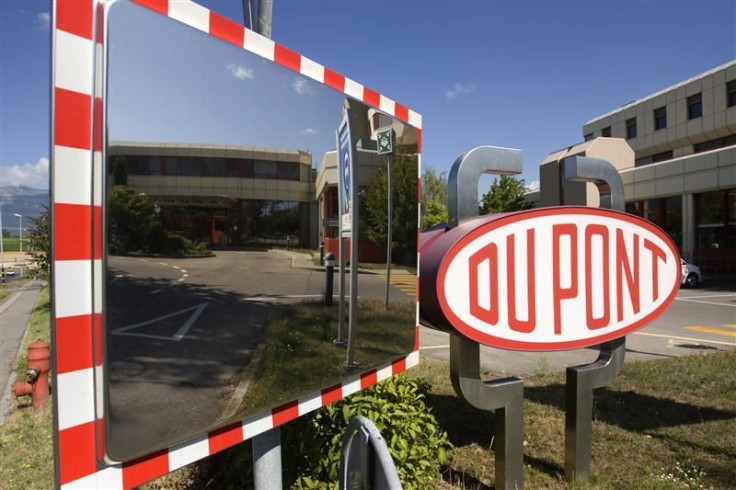Warnings bode ill for earnings

(REUTERS) -- On top of euro-zone debt troubles, Wall Street now has to worry about sagging sales from Europe as a recession in the region seems more likely.
Warnings from companies such as chemical maker DuPont and chip maker Texas Instruments suggest the crisis may already be taking its toll on corporate America.
While holiday shopping started on an upbeat note, corporate warnings could sour the cheerful mood for some investors.
"We are now beginning to see the collateral damage of the events in Europe with the earnings guidance cuts," wrote Peter Boockvar, equity strategist at Miller Tabak & Co in New York.
Fourth-quarter and first-quarter earnings growth estimates for Standard & Poor's 500 companies have been cut sharply since July, underscoring worries about the outlook for companies.
Earnings are now expected to increase 10.1 percent for the fourth quarter, down from a growth estimate of 15 percent at the start of October, and from an estimate of 17.6 percent in July, according to Thomson Reuters data.
The data also showed that negative pre-announcements by companies are outpacing positive ones by the biggest ratio since the second quarter of 2001.
Late Thursday, Texas Instruments cut its revenue outlook for the current quarter, citing lower demand, while DuPont lowered its full-year profit forecast on Friday.
Overseas, German specialty chemicals group Wacker Chemie also cut its outlook, with the industry worried about slower global growth.
Among others in technology, Lattice Semiconductor Corp cut its fourth-quarter revenue outlook on Friday.
Stocks mostly brushed off the bearish news on earnings, focusing instead on Europe after nearly all European Union leaders agreed to build a closer fiscal union to battle the region's sovereign debt crisis.
CHILL WIND FROM EUROPE
But the market for months has struggled with the news from Europe, which featured the lack of resolution to the debt crisis, creating high uncertainty for investors.
"Today was a positive move forward. Unfortunately, European austerity will impact global corporate earnings going into the next year," said Chad Morganlander, a portfolio manager at Stifel, Nicolaus & Co in Florham Park, New Jersey.
"European policy-makers' inability to placate investor fears has business decision-makers hesitant to give positive light to the coming months," he said.
Stocks ended with gains for a second straight week, and the profit warnings came on the heels of what has been considered a fairly robust third-quarter reporting period.
Last week, the Dow rose 1.4 percent, the S&P 500 gained 0.9 percent and the Nasdaq was up 0.8 percent.
For the year, the Dow is up 5.24 percent, while the S&P 500 is off 0.20 percent and the Nasdaq is down 0.23 percent.
Earnings increased 17.9 percent for the third quarter, according to Thomson Reuters data, up from a forecast for 13.1 percent growth in early October.
Prospects for profit and revenue growth have been among the chief reasons why a good number of analysts remain optimistic about stocks heading into 2012.
Kenneth Fisher, a billionaire investor and author whose money management firm oversees $40 billion in assets, said 2012 "will be a very nice year" for the United States.
"Revenue growth, as a function of the economy, is pretty damn gangbusters," he said at the Reuters 2012 Investment Outlook Summit last week.
FORECASTS HIT
Still, the aggregate change in consensus earnings estimates has been coming down even over the past month, according to Thomson Reuters StarMine data. All but two S&P 500 sectors -- healthcare and consumer staples -- show negative earnings revisions to estimates over the past 30 days, the data showed.
Materials and financials are among sectors showing the biggest drops in estimates.
For the fourth quarter, earnings for the materials sector are now expected to have decreased 1.4 percent from a year ago, while in October, earnings were expected to have risen 25.6 percent.
Financials, seen as the sector most sensitive to euro-zone problems, also have taken a hit. Sector earnings are expected to have increased 18.3 percent for the fourth quarter, down from an October 3 forecast for growth of 26.6 percent.
S&P 500 revenue is expected to have increased 6.6 percent in the fourth quarter, compared with revenue growth of 11.1 percent in the third quarter, Thomson Reuters data showed.
"A lot of companies are talking about Europe," and its effect going forward, said Greg Harrison, Thomson Reuters earnings research analyst. Lackluster trading volumes are also going to affect financials here in the United States, he said.
Companies seemed more optimistic heading into 2011. Consumer confidence was higher, and the crisis in Europe seemed more contained.
Among companies with disappointing outlooks a year ago were Xilinx and Jo-Ann Stores, which forecast a weak 2011 profit on Dec 1, 2010, but was bought by a private equity firm in January.
(Reporting by Caroline Valetkevitch; Additional reporting by Ernest Scheyder and Nicola Leske; Editing by Kenneth Barry and Jan Paschal)
(Wall St Week Ahead runs every Sunday)
© Copyright Thomson Reuters 2024. All rights reserved.





















